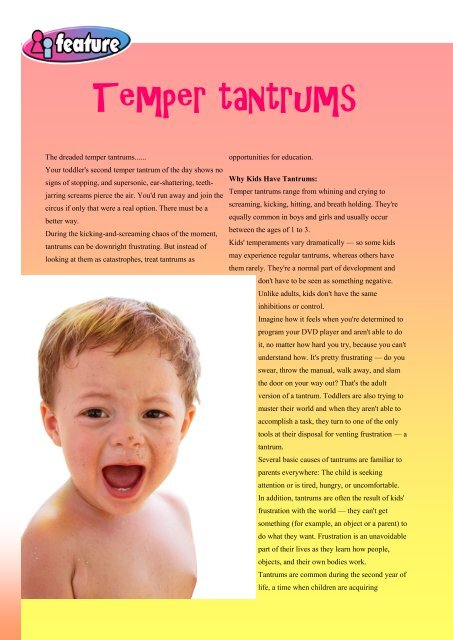You also want an ePaper? Increase the reach of your titles
YUMPU automatically turns print PDFs into web optimized ePapers that Google loves.
The dreaded temper tantrums......<br />
Your toddler's second temper tantrum of the day shows no<br />
signs of stopping, and supersonic, ear-shattering, teeth-<br />
jarring screams pierce the air. You'd run away and join the<br />
circus if only that were a real option. There must be a<br />
better way.<br />
Temper tantrums<br />
During the kicking-and-screaming chaos of the moment,<br />
tantrums can be downright frustrating. But instead of<br />
looking at them as catastrophes, treat tantrums as<br />
opportunities for education.<br />
Why Kids Have Tantrums:<br />
Temper tantrums range from whining and crying to<br />
screaming, kicking, hitting, and breath holding. They're<br />
equally common in boys and girls and usually occur<br />
between the ages of 1 to 3.<br />
Kids' temperaments vary dramatically — so some kids<br />
may experience regular tantrums, whereas others have<br />
them rarely. They're a normal part of development and<br />
don't have to be seen as something negative.<br />
Unlike adults, kids don't have the same<br />
inhibitions or control.<br />
Imagine how it feels when you're determined to<br />
program your DVD player and aren't able to do<br />
it, no matter how hard you try, because you can't<br />
understand how. It's pretty frustrating — do you<br />
swear, throw the manual, walk away, and slam<br />
the door on your way out? That's the adult<br />
version of a tantrum. Toddlers are also trying to<br />
master their world and when they aren't able to<br />
accomplish a task, they turn to one of the only<br />
tools at their disposal for venting frustration — a<br />
tantrum.<br />
Several basic causes of tantrums are familiar to<br />
parents everywhere: The child is seeking<br />
attention or is tired, hungry, or uncomfortable.<br />
In addition, tantrums are often the result of kids'<br />
frustration with the world — they can't get<br />
something (for example, an object or a parent) to<br />
do what they want. Frustration is an unavoidable<br />
part of their lives as they learn how people,<br />
objects, and their own bodies work.<br />
Tantrums are common during the second year of<br />
life, a time when children are acquiring






